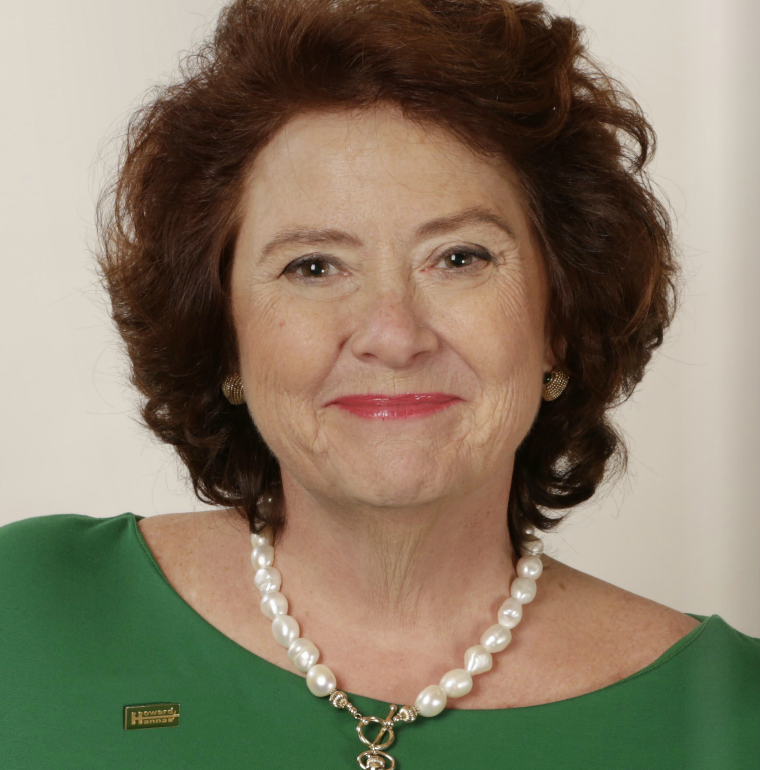President & Chief Executive Officer of Real Estate Brokerage Howard Hanna Real Estate Services
Helen Hanna Casey
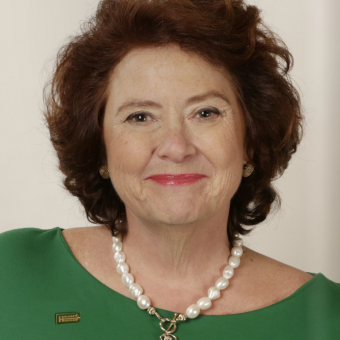
Helen Hanna Casey details her life as a leading woman in business, from her dedication to her family, agents and employees to producing Broadway plays. She chronicles the process of growing a business and delineates what to do, and what not to do, as the member of a family business and a woman entrepreneur.
NAWRB: What does family mean to you and what is your advice to entrepreneurs thinking of going into business with their families?
Helen Hanna Casey: Well, in my case, family means everything. I don’t know anything else except family businesses. It’s been an incredible opportunity as a family to grow together, but also to grow as an individual. So family means everything, first of all. In business, I think why so many families struggle—even though there are all these courses and books for it—is that they fail in some of the key aspects. Those key elements are integration and separation. What I mean is this: you have to separate yourself from the business, but you also always have to be integrated into it. You cannot be outside of your business talking to others about the inside of your business without your family being involved. It’s not like having a job where somebody else is your boss. When you’re in a business with your family, everything always has to be relayed from the inside with your family in mind.
The next part of it is communication, which is a huge reason I think so many entrepreneurs fail in the second and third generations of family businesses; they don’t communicate their expectations to each other. Either the original owner is so powerful that they can’t give up power, or they’re not developing the people around them to create new entities within that same business model that can take over. If I were going into a family business today, I’d be very careful to note what my role was going to be, what the expectations for me were, and what the long-term plan for me was going to be. If I have ownership, what does that mean to me? If the plan is that I’m going to start at one level in the company, how quickly do I rise or not? Do I have to succeed on my own? I think these all need to be defined clearly beforehand. And in many cases, they’re not.
People decide they’re going into a family business with the expectation that they’ll be a senior person. That may work in that family business if everybody is in agreement, but it may not work in many others and you may begin seeing squabbling between generations. I’ve always felt that my sister and I had a great advantage in the family business, and that is because we are two women with one brother and we have an incredible balance that not all businesses have. In the real estate industry, most of the second- and third-generation businesses with sisters that we know have already been bought out.
I think you have to have growth for individuals. If you want money to come in, it is really tough to keep the business the same. One of your goals has to be that you want your company and employees to expand and grow. In our case, it has been to go to other states and enable people to move there. But you can’t just bring four people in to do the job you’ve done yourself. You have to look at the talents of your people and decide how they can help expand the business. That goes back to communication—being able to sit at your dinner table and discuss these things without arguing, but also sit in a boardroom or in an office and do the same thing.
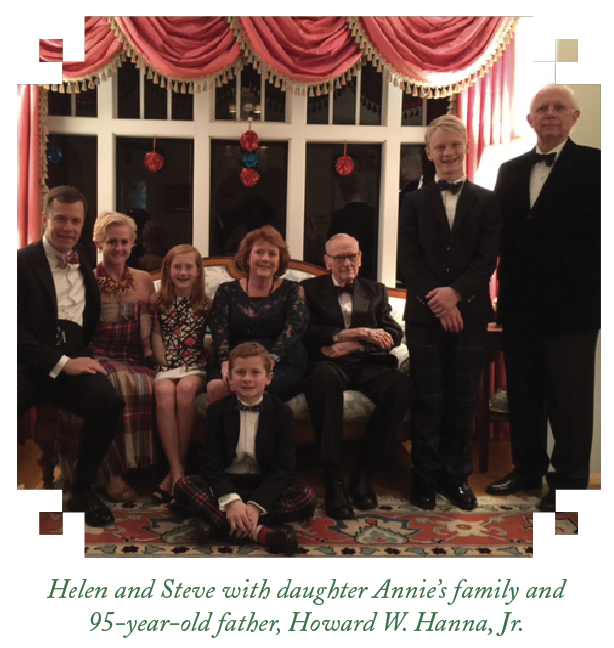
NAWRB: Do you have a preference between discussing executive decisions within a boardroom and at the dining table?
Helen Hanna Casey: I think I like a little bit of both. And I would never say to anybody that we never disagree or never fight; we’ve never had to take a vote, which is pretty amazing. In the history of our business, we have never had to vote on anything. We’re all salespeople, so we should be selling each other on what we believe should be done. It’s a conversation, and that is why I think communication is so important; it’s not just somebody coming in and saying, “We’re going to do this.”
I think you have to have a little bit of both, but I do think you have to be careful at the dining room table with the additional voices. Sometimes, additional voices—spouses, significant others, children who aren’t in the business—are lending their voices without all of the knowledge and experience, so that’s why some of these decisions need to be made at the office. It’s also important not to disregard them because they may be saying something very important that you haven’t addressed. So, you have to listen to them, but you don’t make the decision there. I also have to add that they may be in the business three years from now, so you can’t dismiss them. They may choose to come into the business; they may have to come into the business. At the end of the day, it’s handled on a case-by-case basis, but the decision has to be made at the office. It can’t be made sitting on the couch or sitting around a dinner table.
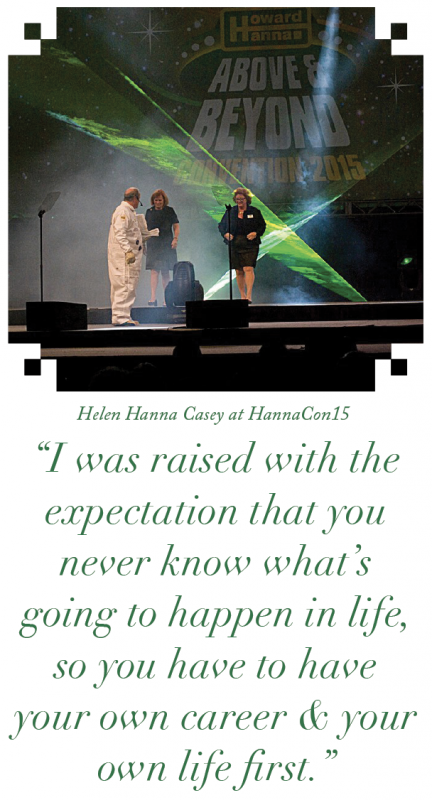
NAWRB: Congratulations on being recently recognized as the most powerful woman in real estate by Swanepoel Power 200! Throughout your life and career, what has been your most memorable achievement?
Helen Hanna Casey: We all answer that our family and our children are our most memorable achievements—and certainly those are mine. But if I were looking at a work accomplishment, I would say it was when we broke into the ranks of the top 10 largest real estate companies in the United States. When we became the eighth largest and my mother said, “You could be the fourth.” I think each of those milestones has been incredible for us. We don’t look back and say that this was our plan all along. We did have a master plan in 1983 of being a regional company, and that’s the master plan we have lived by. But I don’t think we ever had the perspective that a regional company would be this large or this powerful. I would say those are important accomplishments to me. Personally, I love the fact that we have enabled so many people that work together with us to achieve goals that they’ve never even dreamed of. It’s a wonderfully self-satisfying business for this reason. My husband’s an architect, and I like to say that he gets the benefit of seeing the finished product because he sees a building that’s completed, and I don’t get that. But I do get to see people who have accomplished goals and what it means to them.
NAWRB: Who has inspired you most throughout your life?
Helen Hanna Casey: I mentioned her a moment ago – my mother, certainly. Both of my parents, but my mother was a huge driving force. She never went to work, but she ran the business, as we like to say, from her chair at home. We were raised in a household where, except for my brother always being served first at the dinner table, we were pretty equal. My parents expected us to play at the same level and on the same team. It was never that my brother was to be educated and we weren’t. We were all to be educated according to our strengths.
It started with my dad, who hired women in the late 1950s when nobody else would. From there, I have also been blessed to have incredible mentors that I’ve come across – not necessarily in my own business, like the chairman of Westinghouse Electric when Westinghouse Electric was a Fortune 50 company. Just amazing people that I’ve come in contact with. The guy who became the chairman of TNC taught me to read balance sheets at a non-profit. It isn’t always women, by the way. I think you have to have that balance when you look at who was influential in your life. I couldn’t tell you that Gloria Steinem was ever influential in my life. She wasn’t somebody about whom I said, “I want to be like that.” And I went to all-girls schools, I should tell you, from sixth grade on. I was raised with the expectation that you never know what’s going to happen in life, so you have to have your own career and your own life first. During that generation, I thought an all-girls school was an incredible asset to have because you were part of that change. A women’s school taught you to not only be a woman, but also to be an educated woman. To only be a wife and a mother? I never received that kind of advice from any of my teachers in high school or college, but there were girls who were driven solely by those goals. The all-girls schools provided a great way to learn by creating an environment where you could do things that you couldn’t have done at a school where the competition was still male-oriented. For me, a woman’s education is incredibly important.
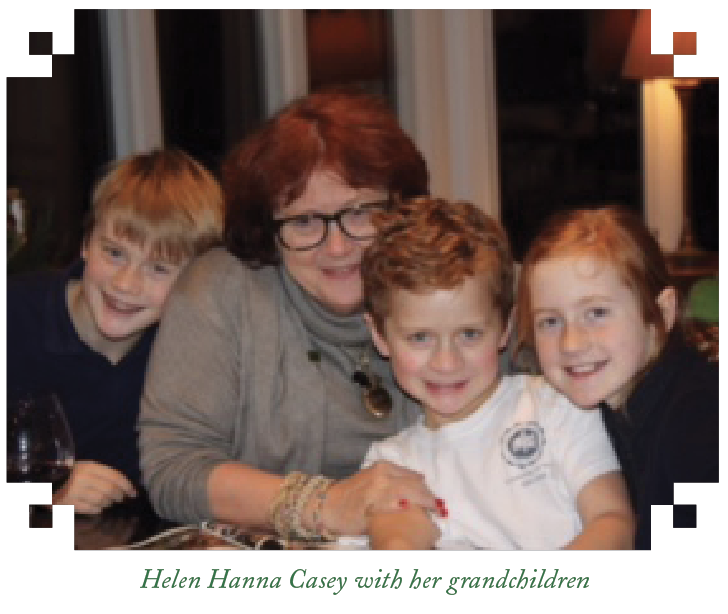
NAWRB: If you hadn’t entered the real estate industry, what career would you most like to have?
Helen Hanna Casey: I would have been a Broadway star or a big criminal attorney. My husband and I produce Broadway shows and have three shows on Broadway right now. We received an award for our commitment to musical theatre a couple of years ago, and during the ceremony we both said why we were producers. I talked about always getting small character parts when I thought I should have been a star, so I switched to directing—which pretty much sums up my career. My husband talked about being cast in Snow White and how he had to wear tights, but wasn’t good enough to be one of the seven dwarfs. He was only a woodsman, so he knew that wasn’t his career either, but he started doing lighting and design and that inspired him to become an architect. Both of us are very much that way: we were inspired to go down another path. But there’s no question, I was born to be on stage.
At Howard Hanna, we just finished our 12th awards rally. We do these rallies annually to recognize everyone’s accomplishments and achievements from the previous year, but to also discuss our plans for the future and how to tackle them. It’s a company-wide event conducted in each region and my entire family attends all of the rallies. It’s a pretty grueling five or six weeks. Every year, I come up with a topic to expound on for the remainder of the year in monthly advice columns. This year, I talked about the company having a past, a present, and a future, and how our job is to see tomorrow, today. That’s what my job as a leader is: to see tomorrow happen today and to provide agents with guidance on how to accomplish their individual goals. The agents that go the extra mile, that do one more thing every day, I ensure then are recognized for their hard work and dedication. Then, I have to gather others to come with me to that future that I see.
We just took our executive team of 50 to 60 people on a four-day-long management review and team building trip. Our keynote speaker was a woman who is one of the top women in the automotive industry. She is the manager of an engine plant for Fiat Chrysler. She talked about how Fiat, when they took over Chrysler, was incredible at communicating their message and then carrying it out throughout the year. That is what our goal is: to take our message and get other people to believe in it.
NAWRB: Fifty-six percent of your executive team is comprised of women. What value do women bring to boardrooms and C-suites, and why is the American workforce having such a hard time implementing gender diversity in its executive offices?
Helen Hanna Casey: Obviously, women bring a lot to the table. We do think in a different language, and we sometimes speak a different language. I don’t know that from just this table by the way—I’m on a bank board where I’m the only woman. I’d say that we don’t think of each other any differently when we’re saying things, but we appreciate the differences that we bring to the table. I think that’s very important. Sometimes you can get into gender stereotyping by believing that what somebody is saying is based on the fact that they’re a 70-year-old man or a 40-year-old woman. You have to be very careful not to do this. I do think there is an essence that a woman brings that men don’t. We also make better executives because we don’t swear as much.
NAWRB: What aspect of your work as President of Howard Hanna do you enjoy the most?
Helen Hanna Casey: Speaking to people. Whether it’s one-on-one or on a stage with a thousand people, I’m incredibly blown away by conversations with individuals, conversations in a big group, and people’s reactions.
NAWRB: How does a day in your life look when work is not a concern? What are your passions outside of the workplace?
Helen Hanna Casey: I have a few. I have wonderful grandchildren. I love being part of their lives and they’re a big part of my life. I still garden, and I try to escape to Florida occasionally just to relax. We travel with our grandchildren. On a regular day, I go work out or go to church; I do my gardening or read a bit. I’m not very good at sitting down and relaxing!
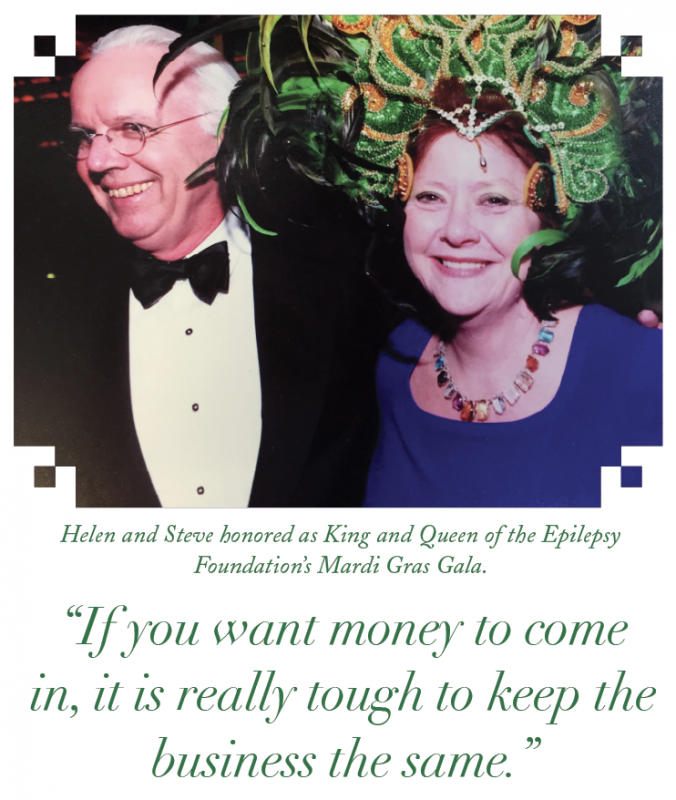
NAWRB: What is the importance of mentorship to you? What can companies do to encourage mentorship for women and the advancement of women in the workforce?
Helen Hanna Casey: First of all, I think mentorship is more than just women mentoring women. More men have to be involved in mentoring women. It can’t just be finding women to mentor women in a diversity program within your company; it has to start at every level. Management has to want to build their future team, and if you’re in a company or environment where everybody believes women are a key component, then it’s everybody’s responsibility to build that. We have so many incredible women who work for us in all different capacities, everybody from our CFO to the mailroom person. We all have to mentor them in whatever their responsibility is. In some cases employees and agents even mentor their daughters.
NAWRB: Howard Hanna is one of the top real estate brokerages in the nation. With all of this success, what would you like to see happen next for the company? What is your most important goal as president?
Helen Hanna Casey: My most important goal as president is to create more jobs for more people. What I mean by that is that if we have successful people, then it is our responsibility to create more opportunities for them. We have to expand in order to help them have the ability to increase their success as well as ours. So I think that’s my most important goal: the individual success of the people who are with us, so that they have the opportunities to do the things that we’ve had the opportunities to do.
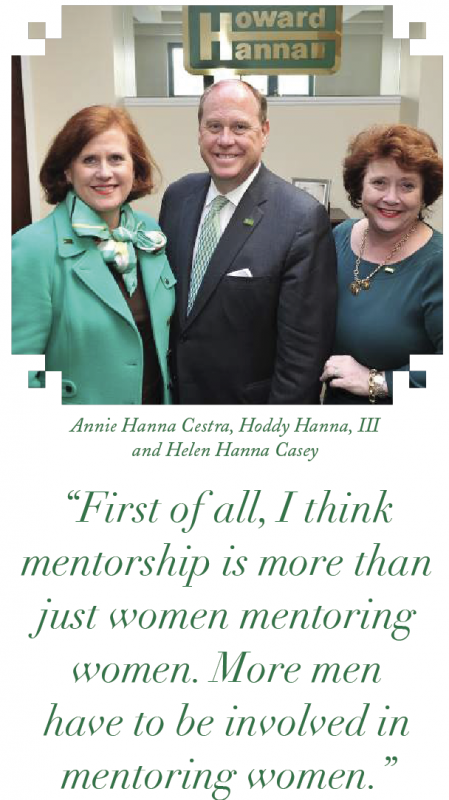
NAWRB: You’ve been a prolific speaker at important events throughout your career, are there any speakers that you admire? Is public speaking something you’ve always enjoyed and endeavored to do?
Helen Hanna Casey: I have to tell you the best motivational speaker I’ve ever heard is Terry Bradshaw. Also, I don’t know if you’ve heard Madeleine Albright. She’s a member of a group called International Women’s Forum, as am I. She came here and had a private luncheon with the Forum of only about 85 people, and was a phenomenal speaker.
NAWRB: What is your advice for women entrepreneurs who are working to establish and grow businesses throughout the country?
Helen Hanna Casey: Number one: don’t think of yourself as a woman entrepreneur, think of yourself as an entrepreneur. Take advantage of the opportunities for women, but don’t limit yourself by believing that’s all that you are. Always believe that you are equal to anybody you’re competing with. I think we as women sometimes diminish that, with all of the award platforms that are out there for women, because we don’t think we have equal opportunity. I believe entrepreneurs – women entrepreneurs especially – have the opportunity to prove to people that we are equal to everything because our destiny is in our hands.
Don’t ever use this as an excuse. Use it to your advantage, but also be prepared to compete as you are. Finally, if you want to compete across the country, you had better be prepared to be on a plane a lot. It is a business in which you cannot do everything with technology. You have got to reach out and meet those clients that you are trying to attract, no matter what your business is. Even if you’re selling software that you’ve developed, you have to meet the clients you want. They have to see you and know you. I do think if you want to grow a business that is regional or national, you have to be in that region and on that platform a couple of times a year at least, if not a couple of times a month. You have to force your way to the table sometimes.
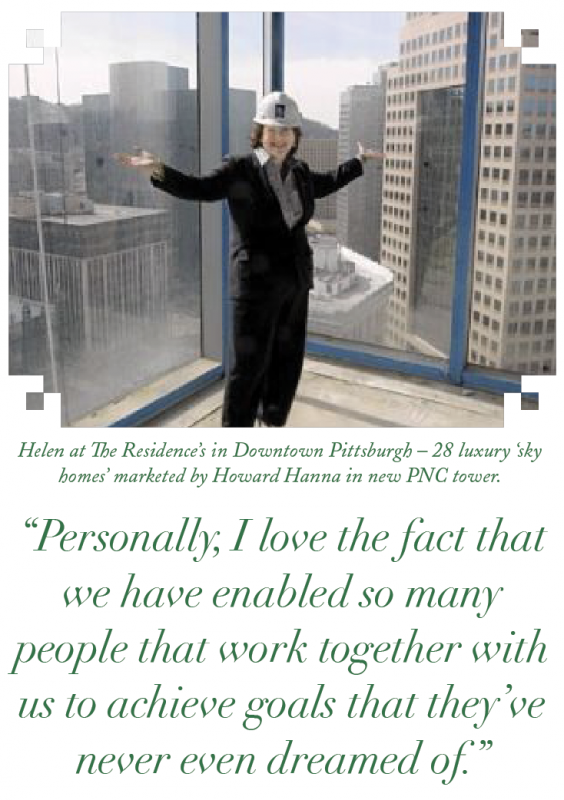

 Login
Login

